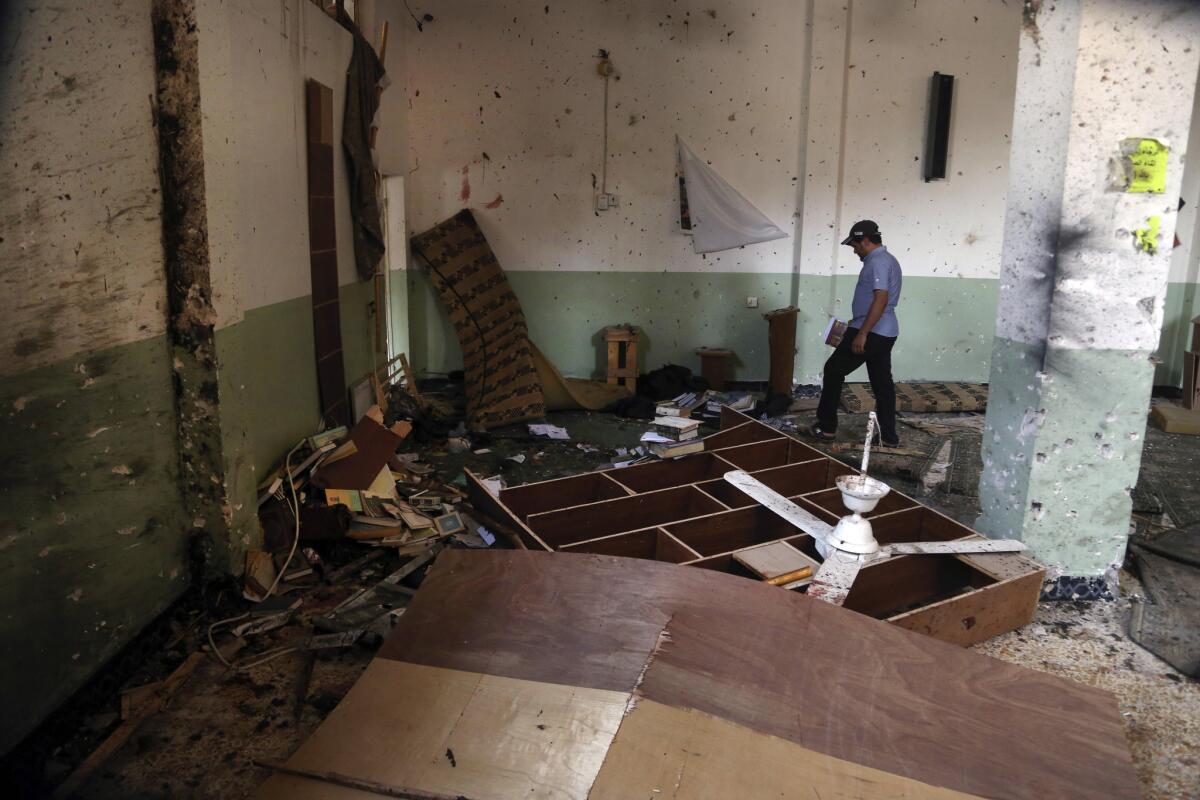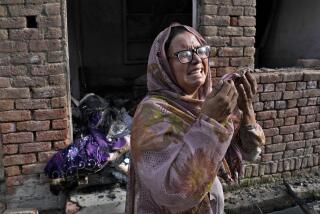Bombings in Iraq target Shiites, kill dozens

- Share via
Reporting from Irbil, Iraq — A wave of bombings struck majority Shiite Muslim areas of Baghdad and two other Iraqi cities Monday, killing at least four dozen people in an apparently worsening spiral of sectarian bloodletting.
In the deadliest incident, a suicide bomber set off his explosives in a mosque, killing 11 people and wounding more than 30 in a poor, predominantly Shiite section of the capital known as New Baghdad.
The Sunni Muslim extremist group Islamic State claimed responsibility for the attack, which it said was in revenge for a mass shooting Friday of Sunni worshipers at a mosque in Diyala province, east of Baghdad, that left 73 people dead.
Four other car bombs exploded in neighborhoods across Baghdad, killing 21 people, while deadly blasts also shook the Shiite holy city of Karbala and the majority Shiite city of Hillah, south of Baghdad.
The attacks came on the day that Prime Minister-designate Haider Abadi held his first official news conference and called for national unity as the country struggles to stop the advance of Islamic State, which has declared a caliphate in the lands it controls in Iraq and Syria.
Abadi condemned the Diyala mosque attack, which has widely been blamed on Shiite militias loyal to the government, and called for the militias to come under Baghdad’s control and cease acting independently. The mosque attack prompted leading Sunni politicians to pull out of crucial talks on forming a new government, which Abadi must complete by Sept. 10.
“All the massacres being committed against the civilians by the armed groups and militias are condemned and rejected,” Abadi said.
As the Obama administration weighs whether to expand airstrikes against Islamic State into Syria, that country pledged to cooperate with international counter-terrorism efforts but said that any military action within its borders must be approved by President Bashar Assad’s government.
“Being serious in combating terrorism isn’t achieved by transgressing against others’ sovereignty,” Foreign Minister Walid Moallem said at a news conference in Damascus, the Syrian capital. “We know better than anyone else what is happening on our land.”
The offer of cooperation by Assad’s government, which the Obama administration has accused of committing crimes against civilians during Syria’s 3-year-old civil war, illustrates how Islamic State’s rise has upended U.S. policy in the Middle East. Last week, the militant group released a video showing one of its fighters beheading American journalist James Foley, an act that could force President Obama to take tougher action.
The United Nations on Monday accused Islamic State militants of “appalling, widespread and systematic deprivation of human rights,” including targeted killings, abductions and sexual abuse in areas under their control.
U.N. human rights chief Navi Pillay said the Sunni extremists were singling out religious and ethnic minorities, including Christians, Yazidis, ethnic Turkmens and other groups, as they promulgate a fundamentalist form of Islam.
Pillay said the U.N. had received credible reports that hundreds of Iraqis had been abducted and that many were executed for refusing to convert to Islam.
“Such persecution would amount to crimes against humanity,” Pillay said in a statement.
Special correspondent Nabih Bulos in Amman, Jordan, contributed to this report.
Follow news out of Iraq on Twitter at @SBengali
More to Read
Sign up for Essential California
The most important California stories and recommendations in your inbox every morning.
You may occasionally receive promotional content from the Los Angeles Times.











